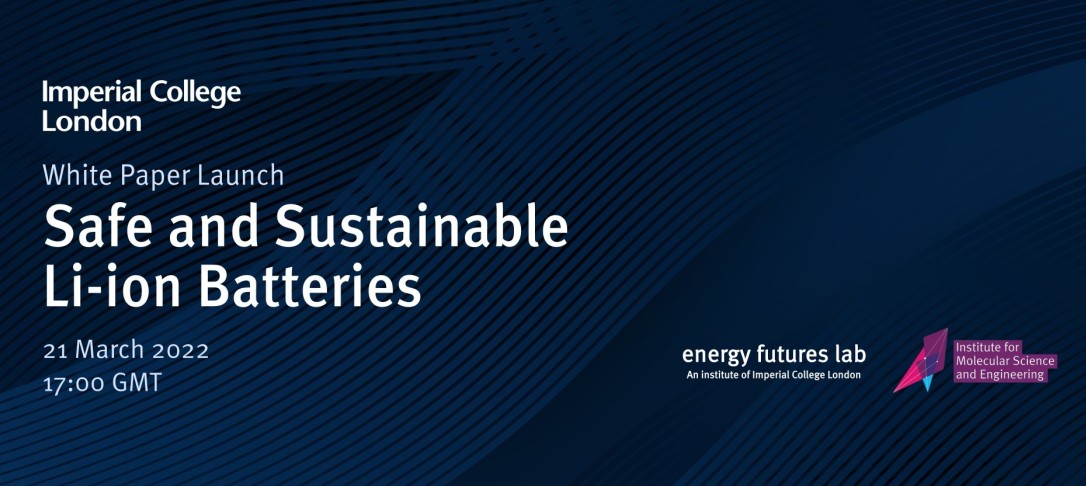
White Paper Launch:
Safe and Sustainable Lithium-ion Batteries
Since they were first commercialised 30 years ago, we have become increasingly reliant on lithium-ion batteries. Used in everything from phones and computers to electric vehicles and electricity grids, they provide an attractive combination of affordability, high energy and power densities, high cycling efficiencies and lifetimes. However, as demand for these batteries has increased, researchers, manufacturers and consumers have questioned the economic benefits, pressure on raw materials and sustainability of a battery economy.
This has led to expanding research on the environmental impact of lithium-ion batteries via lifecycle assessment, battery waste management, second life applications and energy efficient and environmentally benign recycling of end-of-life EV batteries. Safety of batteries throughout their life cycle, including the production, usage and recycling phases, is also critical. The new White Paper from Imperial College London’s Energy Futures Lab and the Institute for Molecular Science and Engineering investigates the safety and sustainability of lithium-ion batteries, exploring ways of reducing their impact on the environment and ensuring they do not pose a danger to health of workers or users.
In this launch event, co-authors Dr Laura Lander and Evangelos Kallitsis will provide an overview of the paper and will then be joined for a panel discussion by Professor Anna Korre, Co-Director of Energy Futures Lab, and Professor Gregory Offer, Professor in Electrochemical Engineering at Imperial’s Department of Mechanical Engineering. The discussion will be chaired by Professor Amparo Galindo, Co-Director Institute for Molecular Science and Engineering.
Speakers:
- Dr Laura Lander is a postdoctoral research associate at Imperial College London focusing on the sustainability and techno-economics of Li-ion and next-generation batteries. She has a strong background in the synthesis and structural and electrochemical characterisation of innovative cathode materials for Li- and Na-ion batteries. She has (co-)authored 15 peer-reviewed publications.
- Evangelos Kallitsis is a PhD Candidate at Imperial College London. Trained as a Chemical Engineer (MEng, University of Patras, 2017) with a specialisation in Process Systems Engineering (MSc, Imperial College London, 2018), his research combines environmental and techno-economic modelling to study the production, use and recycling of lithium-ion batteries from a life cycle perspective.
- Professor Anna Korre is Professor of Environmental Engineering in the Department of Earth Science & Engineering and Co-Director of Energy Futures Lab. Her role is to facilitate interdisciplinary research, education and translation across Imperial College in the field of energy. Anna leads the Minerals Energy and Environmental Engineering Group (MERG) and her own research interests are in the areas of risk and uncertainty assessment and the environmental and life cycle assessment of engineering systems.
- Professor Gregory Offer is Professor in Electrochemical Engineering and leads the Electrochemical Science & Engineering Group at Imperial College London. Since 2010, he has worked with multiple industry partners on projects worth over £45.2 million. Greg has also worked as a management consultant and a government advisor. He has published >100 peer reviewed journal papers, patents, technical reports and books. He is a co-founder of three battery related start-ups, Cognition Energy Ltd, Breathe Battery Technologies Ltd and About:Energy Ltd.
- Professor Amparo Galindo (chair) is Co-Director Institute for Molecular Science and Engineering at Imperial College London. Her research interests are in the development of statistical mechanical approaches for complex systems, and their application to processes relevant to industry.
About Energy Futures Lab
Energy Futures Lab is one of seven Global Institutes at Imperial College London. The institute was established to address global energy challenges by identifying and leading new opportunities to serve industry, government and society at large through high quality research, evidence and advocacy for positive change. The institute aims to promote energy innovation and advance systemic solutions for a sustainable energy future by bringing together the science, engineering and policy expertise at Imperial and fostering collaboration with a wide variety of external partners.
About the Institute for Molecular Science and Engineering (IMSE)
Founded in 2015, IMSE brings engineers, scientists, clinicians and business researchers together from Imperial’s four faculties to find molecular-based solutions to grand challenges facing our world. By blurring the boundaries between molecular science and engineering, and changing the way scientists and engineers work together, the aim of the institute is to accelerate the pace of development to address these challenges. The Institute co-ordinates a range of integrated activities to enable researchers at Imperial and elsewhere to engineer novel products and solutions that are firmly based on advances in molecular science and engineering.